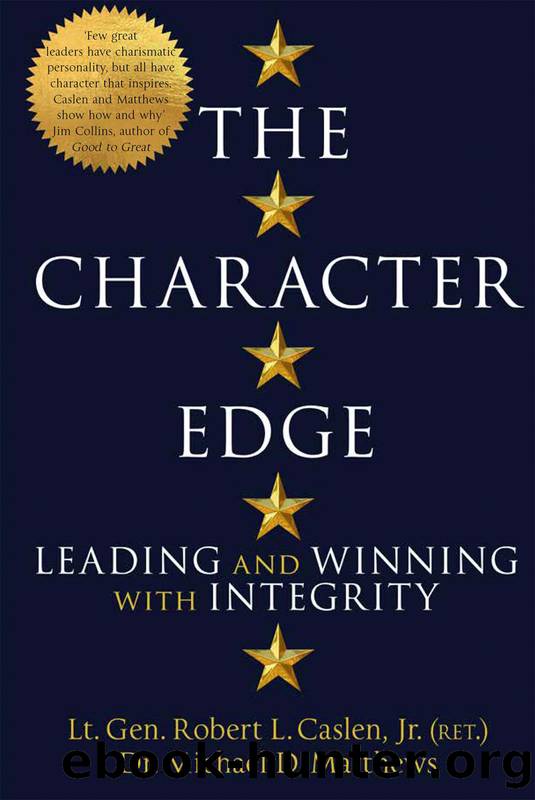The Character Edge by Robert Caslen

Author:Robert Caslen
Language: eng
Format: epub
Publisher: Pan Macmillan UK
APTITUDE MYOPIA
So far so good, but standard hiring strategies only go so far in assessing character. These strategies focus mostly on talent, narrowly defined as intelligence or aptitude-test scores. The military gives the Armed Services Vocational Aptitude Battery (ASVAB) to hundreds of thousands of potential recruits each year. Fall below the cutoff score, and you will not be allowed to join any branch of the military. The ASVAB is akin to a test you may be more familiar withâthe SAT. You, or your children, have probably taken this assessment. Your score on the SAT plays a major role in determining the college or university that you will attend. A high score is necessary, but not sufficient, to elicit an offer from an elite university. Fall a bit below that and you may find yourself attending a second-tier school. Score even lower, and you will likely end up, at least initially, in a community college or a trade school. This may happen even though, with hard work and determination, you had excellent grades in high school.
If you have ever been denied a job or entry into a college because of test scores, you may have experienced aptitude myopia. This bias stems from over a hundred years of psychologists putting the bulk of their efforts into developing and refining a variety of tests for intelligence and aptitude. Human-relations specialists like these tests because they are reliable and valid. But at the very best they only predict about 25 percent of performance in work and academic success. If talent assessments alone account for such a small percent of success, that means 75 percent or more of performance is related to other attributes. And here is the challenge. Psychologists and HR specialists do not have sophisticated or valid ways to identify and assess these attributes.
Aptitude myopia is problematic for organizations that want to fill their ranks with high-performing individuals. Think about the high school student who studies diligently, takes summer classes, gets tutoring when needed, and graduates with an A average. But for whatever reason, this student does not excel at standardized tests such as the SAT, scoring only average. So he or she is denied admission to top-tier universities. If you were predicting this studentâs success in college, which factor would you put your money on? The mediocre SAT score (accounting for fewer than 25 percent of potential success) or the grit and determination (accounting for a significant chunk of potential for success) displayed by the student over four long years of study in high school?
To be clear, the SAT and similar tests are useful in predicting college success especially when combined with high school grades, which has been the most powerful way to predict future academic performance. However, considering noncognitive attributes, in conjunction with standardized test scores, will optimize the prediction of who will succeed and who will fail. The applicant with high academic potential, as measured by the SAT, combined with high grit, self-regulation, love of learning, and so forth is the ideal combination of cognitive and noncognitive abilities.
Download
This site does not store any files on its server. We only index and link to content provided by other sites. Please contact the content providers to delete copyright contents if any and email us, we'll remove relevant links or contents immediately.
International Integration of the Brazilian Economy by Elias C. Grivoyannis(57424)
The Art of Coaching by Elena Aguilar(50146)
Flexible Working by Dale Gemma;(22956)
How to Stop Living Paycheck to Paycheck by Avery Breyer(19224)
The Acquirer's Multiple: How the Billionaire Contrarians of Deep Value Beat the Market by Tobias Carlisle(11684)
The Radium Girls by Kate Moore(10929)
Thinking, Fast and Slow by Kahneman Daniel(10640)
The Art of Thinking Clearly by Rolf Dobelli(8878)
Hit Refresh by Satya Nadella(8348)
The Compound Effect by Darren Hardy(7586)
Atomic Habits: Tiny Changes, Remarkable Results by James Clear(7244)
Turbulence by E. J. Noyes(7062)
Tools of Titans by Timothy Ferriss(6978)
How to Be a Bawse: A Guide to Conquering Life by Lilly Singh(6708)
Change Your Questions, Change Your Life by Marilee Adams(6668)
Nudge - Improving Decisions about Health, Wealth, and Happiness by Thaler Sunstein(6648)
Win Bigly by Scott Adams(6330)
The Black Swan by Nassim Nicholas Taleb(6213)
A Court of Wings and Ruin by Sarah J. Maas(6126)
